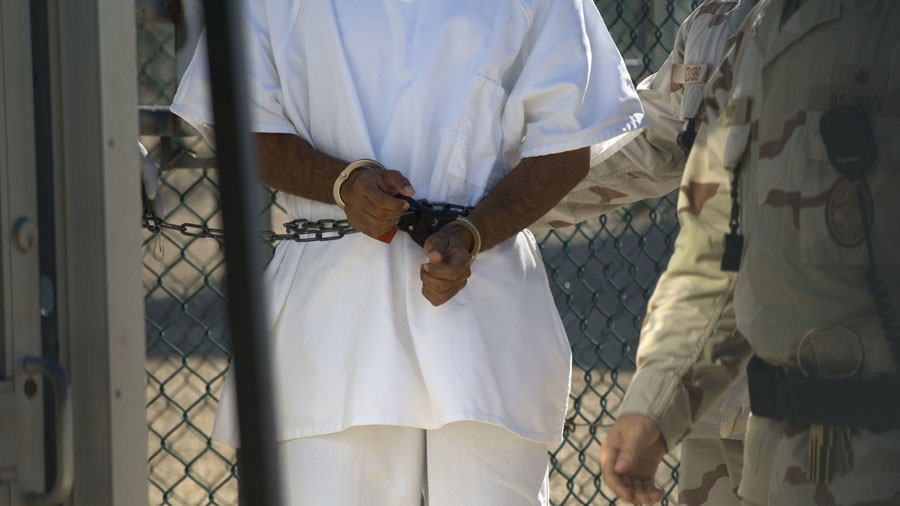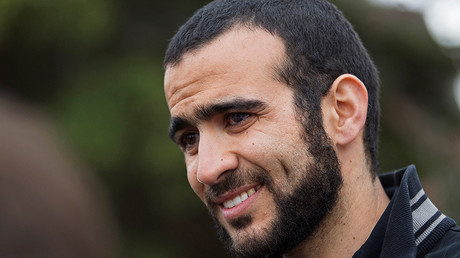US sends 'dangerous message' by turning blind eye to Guantanamo tortures - UN

The US is in “clear violation” of the United Nations Convention against Torture over “gruesome” abuses committed by its agents in locations such as Guantanamo Bay, according to a UN official.
The UN's special rapporteur on torture, Nils Melzer, noted in a Wednesday statement that "perpetrators and policymakers responsible for years of gruesome abuse have not been brought to justice, and the victims have received no compensation or rehabilitation," despite a 2014 Senate Intelligence Committee report acknowledging the use of torture in US custody.
The UN rapporteur also stated that torture reportedly continues at US sites, including Guantanamo, despite former President Barack Obama ending the use of "enhanced interrogation techniques" in a 2009 executive order.
Melzer accused the US of being in "clear violation" of the UN's Convention against Torture and of sending a "dangerous message of complacency and impunity to officials in the US and around the world."
He stressed that his particular concern regards detainees who face "prolonged detention in almost complete isolation," according to a release on the website of the Office of the United Nations High Commissioner for Human Rights.
He stressed that his particular concern regards detainees who face "prolonged detention in almost complete isolation," according to a release on the website of the Office of the United Nations High Commissioner for Human Rights.
Melzer noted the case of Guantanamo inmate Ammar al-Baluci, a Pakistani citizen and alleged 9/11 co-conspirator, who was named 153 times in the 2014 Senate Intelligence Committee report. Baluci is said to have suffered torture during more than three years at CIA "black sites" before eventually being moved to Guantanamo, where he reportedly endures further abuse.
“Mr al-Baluchi has been held in isolation at a severely restricted-access facility at Guantanamo Bay for more than a decade,” Melzer said, elaborating that "noise and vibrations are reportedly still being used against him, resulting in constant sleep deprivation and related physical and mental disorders, for which he allegedly does not receive adequate medical attention."
The special rapporteur made clear that the ban on torture and ill-treatment is "absolute and allowed for no exceptions whatsoever," according to the UN release. “This is one of the most fundamental norms of international law, and its violation is listed among the most serious international crimes, including crimes against humanity and war crimes,” Melzer said.
"...I therefore now urge the US to live up to its legacy, to end its policy of impunity and to bring its own perpetrators to justice," Melzer added. He noted that a "society bruised by torture and abuse" can only heal when the "truth about secret policies and practices is fully disclosed to the public and when full reparation and rehabilitation is granted to victims."
Melzer also requested once again to be allowed an official visit to Guantanamo and to interview inmates. "I very much regret that, despite repeated requests, my predecessors and I have consistently been refused access to Guantanamo and other high security facilities, in accordance with the standard terms of reference of my UN mandate,” he said.
Guantanamo Bay, which turned 15 years old in January, has long been the subject of scrutiny from the US and abroad, particularly for its use of torture and for holding prisoners without charge. Although President Obama campaigned with a promise to shut it down, that vow was never fulfilled. Meanwhile, his successor Donald Trump has expressed his support for the facility.
"There should be no further releases from Gitmo," Trump tweeted in January, less than three weeks before his inauguration. "These are extremely dangerous people and should not be allowed back onto the battlefield."
Around 800 prisoners have been detained there over the years, often subjected to "enhanced interrogation techniques"including waterboarding. Some have reportedly been stripped naked and confined to dark cells for significant periods of time. Inmates went on a major hunger strike in 2013 to protest their detention and treatment at the facility, resulting in authorities force-feeding them.



0 Comments:
Post a Comment
Subscribe to Post Comments [Atom]
<< Home